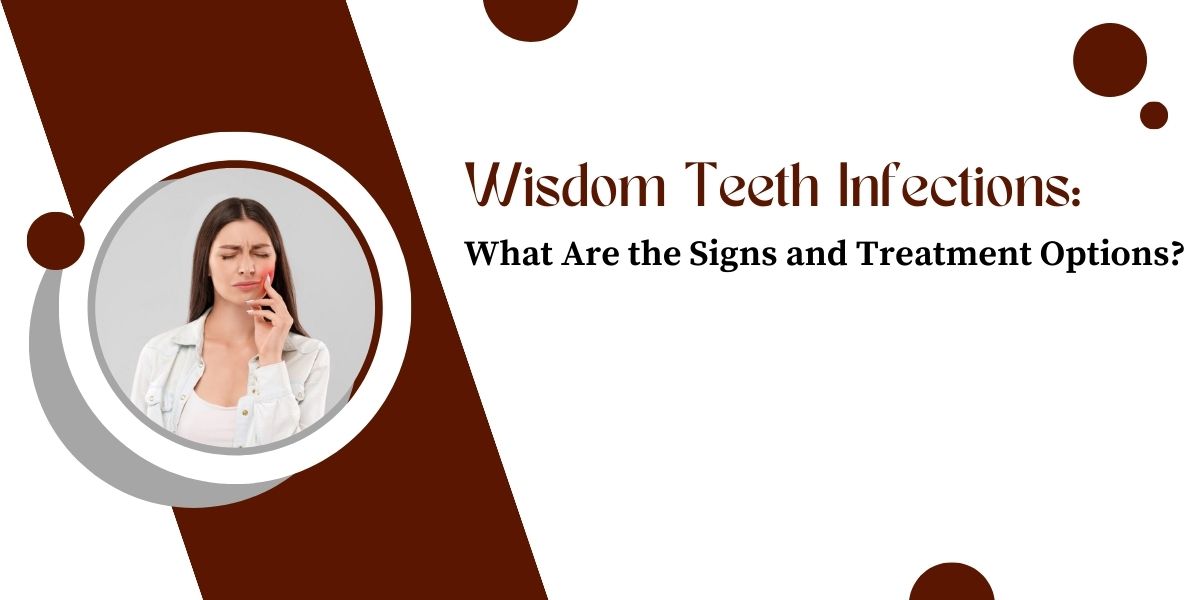When you get final set of teeth, the third molars often come with complications and discomfort. Due to late eruption at the ages of 17-25, wisdom teeth infection is the primary concern of the people. Plus, on being non-attentive it will cause more severe complexities and hence you must be able to detect the infection.
Figuring out the symptoms will be really helpful for intervention and seek effective treatment. Read this blog to know what are its potential signs and efficient treatment methods.
What is wisdom tooth?
Wisdom tooth, acronym as third molar is the final set of teeth you get in the mouth. Basically, it emerges at the back side of mouth on both sides when you are 17-25. Mostly, people get 4 wisdom teeth but there are many people who have less or none at all.
As the name suggests wisdom teeth it develops in the later teen years or early adulthood of the person. While it is considered that they have some wisdom. It has no important function and most of the time poses a challenge. Because of limited space, late eruption and heighten the risk of complications.
How to identify your wisdom teeth infections
Several indications will emerge once you get the infections. You have to identify these infected wisdom tooth symptoms, which may include:
- Discomfort and throbbing pain in back of mouth- Infection in the wisdom tooth will let you feel persistent and sharp pain along with discomfort in the tooth area. The pain may be mild to severe but will worsen down with chewing and biting.
- Redness and swelling in gums around the infected tooth- Inflammation and redness in gum tissue surrounding the affected tooth is quite normal. You will feel tender gums and irritated appearance at the site of infection.
- Problem with swallowing and opening your mouth- You will find it tough to open the mouth and swallow due to inflammation and swelling. Restricted jaw movement will lead to discomfort interfering with regular chores like speaking and eating.
- Bad breath- With infected wisdom teeth it is obvious to emit foul smell or bad breath from the mouth. Even you will feel foul taste in the mouth because of invasion of bacteria causing pus in the affected area.
- Earache and headache on the infected side- The swelling and pain of wisdom teeth infection can spread to its surrounding areas causing earache and headache on the side of infection.
- Discharge or pus in the gum area- Unusual discharge or presence of pus is the clear indication of infection in the wisdom teeth. Often this discharge accompanies by foul smell.
Remember, all the symptoms differ from a person to another. So, in case of noticing any of these you must consult with a dentist for diagnosis and proper treatment. To keep the risk of further complications at bay.
What are the treatment options available?
On visiting the dentist, they will conduct an extensive dental exam to diagnose the condition and offer the treatment.The effective wisdom tooth infection treatment options are in the below:
- Antibiotics- In case the wisdom teeth infection results in acute infection or there is a chance of radiating the infection you will receive antibiotics. It will combat against the symptoms, alleviating inflammation and eventually infection. Often, you can receive it as a combination treatment along with other available options.
- Pain management- Anti-inflammatory and pain relieving medications are effective for pain management effectively dealing with swelling. You can also seek temporary relief from OTC pain killers.
- Rinse with warm saltwater- Dentist will advise the patients for rinsing the mouth using lukewarm saltwater and deal with discomfort and inflammation. It will promote healing at the same time.
- Extraction of wisdom tooth- This option of pericoronitis treatment comes to help when other options failed. Also, dentist determines this is the ultimate option when the tooth is infected. And impacted severely leading to other recurrent dental issues. Extraction procedure involves using of local anaesthesia to numb the area to remove the tooth successfully. Proper aftercare is also involved in this process.
- Surgical intervention- For more complicated condition, surgery is the ultimate choice to remove the infected wisdom teeth. That involves incision in the gum tissue, removal of the bone and separation of the tooth into parts to extract it easily.
The selection of treatment option depends on the severity of the condition, infection intensity, position of the wisdom tooth along with individual patient aspects. Therefore, it is crucial to consult with the dentist for correct diagnosis and personalised treatment. To deal with your condition promoting overall dental health simultaneously.
Also read: Your helpful guide to root canal treatment
Conclusion
It is really important to identify the common symptoms of wisdom tooth infection to seek prompt and effective treatment. When you experience the above-mentioned symptoms, visit to the dentist without further delay. Otherwise, untreated infections can lead to several complexities including cellulitis, abscess formation and others. On-time treatment at Thousand Smiles London will not only help you to manage the symptoms but also mitigate the risk of additional complexities further.
Stay tuned for more news and updates on Frolic Beverages!











